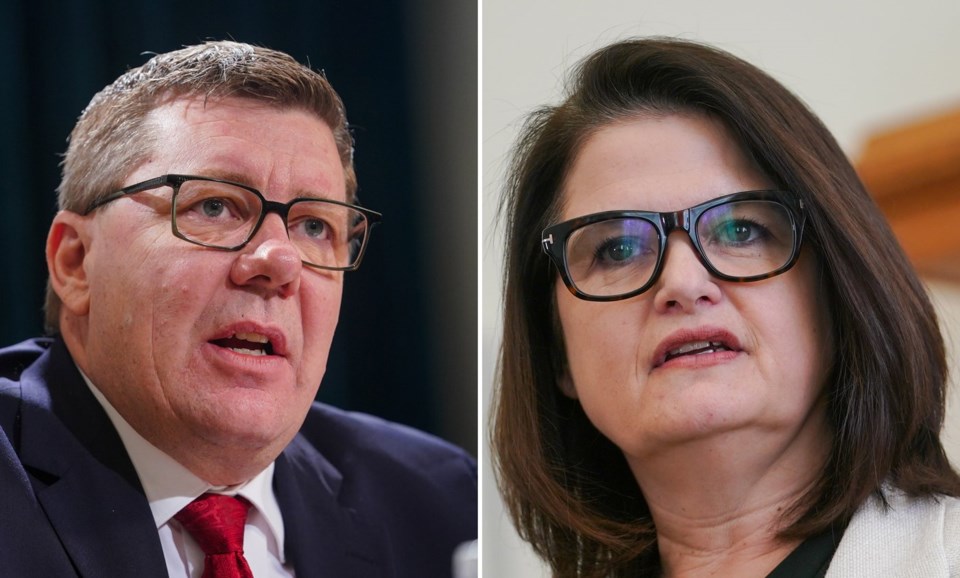REGINA — Saskatchewan's election campaign entered its final day Sunday, with both main party leaders vying for government in what has shaped up to be the tightest race in nearly two decades.
Scott Moe's Saskatchewan Party is seeking a fifth-straight majority after 17 years in office, while Carla Beck's NDP is looking to take back government for the first time since 2007.
Political experts say Moe is still favoured to win, given his party's strength in rural areas, but the question is: How small of a Saskatchewan Party majority could it be?
Election day is Monday.
"I think the parties are much closer than they've been in 17 years," Charles Smith, a professor of political studies at St. Thomas More College in Saskatoon, said in a recent interview.
"For the first time in well over a decade, (the NDP) is competitive in ways they haven't been."
Tom McIntosh, a political scientist at the University of Regina, said the electoral map favours the Saskatchewan Party.
"The NDP are the sort of happy warriors of the campaign," McIntosh said.
"I'm not sure the Sask. Party is showing that same kind of enthusiasm. That would be hard to do when you know you've got a massive majority, and you know it's going to be substantially cut by any measure."
Daniel Westlake, a political studies professor at the University of Saskatchewan, said Moe may lose a lot of urban seats, including those in the smaller cities of Prince Albert and Moose Jaw.
"I'm hesitant to predict anything with any kind of certainty, but right now, it looks like a race where the Saskatchewan Party probably loses seats but still forms government," Westlake said.
Polls have suggested a tightening race between both parties, but the breakdown on constituencies means an uphill fight for the NDP.
To win a majority in the 61-seat legislature, the NDP would need to sweep the 28 seats in the three largest cities — Saskatoon, Regina and Prince Albert — and hope for help elsewhere.
At dissolution, the governing Saskatchewan Party had 42 seats, while the Opposition NDP had 14. There were four Independents and one seat was vacant.
The campaign has largely focused on health care, affordability and crime, though Moe raised the issue of school change rooms later in the race.
In his pledge, Moe said his first order of business if re-elected would be to ban “biological boys” from using school changing rooms with “biological girls.”
He made the promise after learning of a complaint at a southeast Saskatchewan school about two biological boys using a girls change room. The pledge was not previously included in his party’s platform document.
A parent of the two children subject to the complaint is an NDP candidate. Moe has said he didn’t know that when he made the promise.
Beck has said the ban would make vulnerable kids more vulnerable. She’s also promised to repeal a Saskatchewan Party law that requires parental consent when children under 16 want to change their names and pronouns at school.
Beck has said voters want the next government to deal with more pressing issues, including classroom sizes, fixing health care and being able to afford gas and groceries.
Smith said he thinks Moe's change-room plan is meant to lure social conservatives who might be eyeing the right-wing Saskatchewan United Party.
"I also think attacking a candidate's children is very concerning, although he (says) he didn't know it," Smith said.
McIntosh said the change-room issue isn't top of mind for voters.
"Where it does motivate people, they were likely already going to vote Sask. Party anyway," he said.
On Saturday in Saskatoon, Moe said incumbent provincial governments have had it tough.
"And that's likely, you know, the case we're having -- a challenging election I would say here in Saskatchewan," Moe said.
Blaine Higgs' New Brunswick Progressive Conservatives were defeated last week to Susan Holt's Liberals. Higgs, who lost his own seat, was in power for six years.
Beck said Saturday in Saskatoon there's a "feeling of change" out there.
"I'm not taking anything for granted. I'm not built that way. I know we're going to have to knock every door and pull every vote, but I am feeling optimistic," Beck said.
A spokesperson for Moe said he didn't have any public events scheduled for Sunday.
Moe has promised broad tax relief and to continue withholding federal carbon levy payments to Ottawa.
His platform is to cost an additional $1.2 billion over four years. He says his tax reduction plan would save a family of four $3,400 over four years. It also includes tax credits for those looking to grow their families or put their children in sports and arts.
Moe has promised deficits in the first two years, followed by a surplus in 2027.
On Sunday, Beck told supporters in Regina people have had enough of Moe's Saskatchewan Party.
"(The Saskatchewan Party) has used fear tactics, playing on worst instincts, because they are terrified of losing power," she said.
"This province belongs to the people of Saskatchewan, not any politician. Saskatchewan belongs to you.
"We are better than this, and we know damn well you deserve better than this."
She has pledged to spend more to fix health care and education, pause the gas tax, and remove the provincial sales tax on children's clothes and some grocery items.
Beck says her promises are to cost an additional $3.5 billion over four years, with plans to balance the budget by the end of her term.
This report by The 91‘≠¥¥ Press was first published Oct. 27, 2024.
Jeremy Simes, The 91‘≠¥¥ Press


